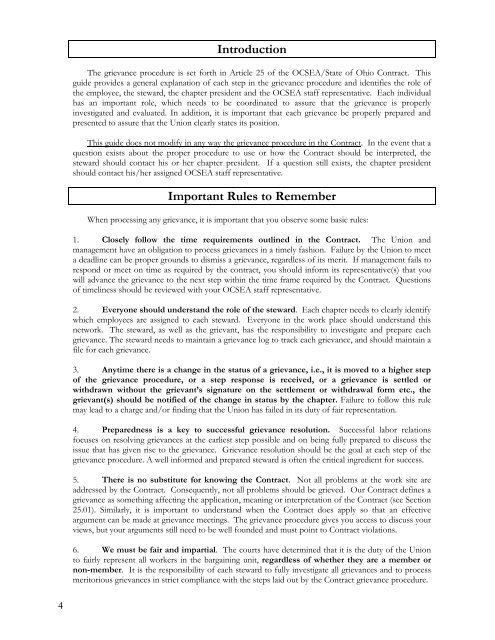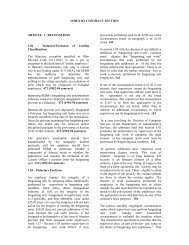Download the Grievance Guide - OCSEA
Download the Grievance Guide - OCSEA
Download the Grievance Guide - OCSEA
Create successful ePaper yourself
Turn your PDF publications into a flip-book with our unique Google optimized e-Paper software.
Introduction<br />
The grievance procedure is set forth in Article 25 of <strong>the</strong> <strong>OCSEA</strong>/State of Ohio Contract. This<br />
guide provides a general explanation of each step in <strong>the</strong> grievance procedure and identifies <strong>the</strong> role of<br />
<strong>the</strong> employee, <strong>the</strong> steward, <strong>the</strong> chapter president and <strong>the</strong> <strong>OCSEA</strong> staff representative. Each individual<br />
has an important role, which needs to be coordinated to assure that <strong>the</strong> grievance is properly<br />
investigated and evaluated. In addition, it is important that each grievance be properly prepared and<br />
presented to assure that <strong>the</strong> Union clearly states its position.<br />
This guide does not modify in any way <strong>the</strong> grievance procedure in <strong>the</strong> Contract. In <strong>the</strong> event that a<br />
question exists about <strong>the</strong> proper procedure to use or how <strong>the</strong> Contract should be interpreted, <strong>the</strong><br />
steward should contact his or her chapter president. If a question still exists, <strong>the</strong> chapter president<br />
should contact his/her assigned <strong>OCSEA</strong> staff representative.<br />
Important Rules to Remember<br />
When processing any grievance, it is important that you observe some basic rules:<br />
1. Closely follow <strong>the</strong> time requirements outlined in <strong>the</strong> Contract. The Union and<br />
management have an obligation to process grievances in a timely fashion. Failure by <strong>the</strong> Union to meet<br />
a deadline can be proper grounds to dismiss a grievance, regardless of its merit. If management fails to<br />
respond or meet on time as required by <strong>the</strong> contract, you should inform its representative(s) that you<br />
will advance <strong>the</strong> grievance to <strong>the</strong> next step within <strong>the</strong> time frame required by <strong>the</strong> Contract. Questions<br />
of timeliness should be reviewed with your <strong>OCSEA</strong> staff representative.<br />
2. Everyone should understand <strong>the</strong> role of <strong>the</strong> steward. Each chapter needs to clearly identify<br />
which employees are assigned to each steward. Everyone in <strong>the</strong> work place should understand this<br />
network. The steward, as well as <strong>the</strong> grievant, has <strong>the</strong> responsibility to investigate and prepare each<br />
grievance. The steward needs to maintain a grievance log to track each grievance, and should maintain a<br />
file for each grievance.<br />
3. Anytime <strong>the</strong>re is a change in <strong>the</strong> status of a grievance, i.e., it is moved to a higher step<br />
of <strong>the</strong> grievance procedure, or a step response is received, or a grievance is settled or<br />
withdrawn without <strong>the</strong> grievant’s signature on <strong>the</strong> settlement or withdrawal form etc., <strong>the</strong><br />
grievant(s) should be notified of <strong>the</strong> change in status by <strong>the</strong> chapter. Failure to follow this rule<br />
may lead to a charge and/or finding that <strong>the</strong> Union has failed in its duty of fair representation.<br />
4. Preparedness is a key to successful grievance resolution. Successful labor relations<br />
focuses on resolving grievances at <strong>the</strong> earliest step possible and on being fully prepared to discuss <strong>the</strong><br />
issue that has given rise to <strong>the</strong> grievance. <strong>Grievance</strong> resolution should be <strong>the</strong> goal at each step of <strong>the</strong><br />
grievance procedure. A well informed and prepared steward is often <strong>the</strong> critical ingredient for success.<br />
5. There is no substitute for knowing <strong>the</strong> Contract. Not all problems at <strong>the</strong> work site are<br />
addressed by <strong>the</strong> Contract. Consequently, not all problems should be grieved. Our Contract defines a<br />
grievance as something affecting <strong>the</strong> application, meaning or interpretation of <strong>the</strong> Contract (see Section<br />
25.01). Similarly, it is important to understand when <strong>the</strong> Contract does apply so that an effective<br />
argument can be made at grievance meetings. The grievance procedure gives you access to discuss your<br />
views, but your arguments still need to be well founded and must point to Contract violations.<br />
6. We must be fair and impartial. The courts have determined that it is <strong>the</strong> duty of <strong>the</strong> Union<br />
to fairly represent all workers in <strong>the</strong> bargaining unit, regardless of whe<strong>the</strong>r <strong>the</strong>y are a member or<br />
non-member. It is <strong>the</strong> responsibility of each steward to fully investigate all grievances and to process<br />
meritorious grievances in strict compliance with <strong>the</strong> steps laid out by <strong>the</strong> Contract grievance procedure.<br />
4

















